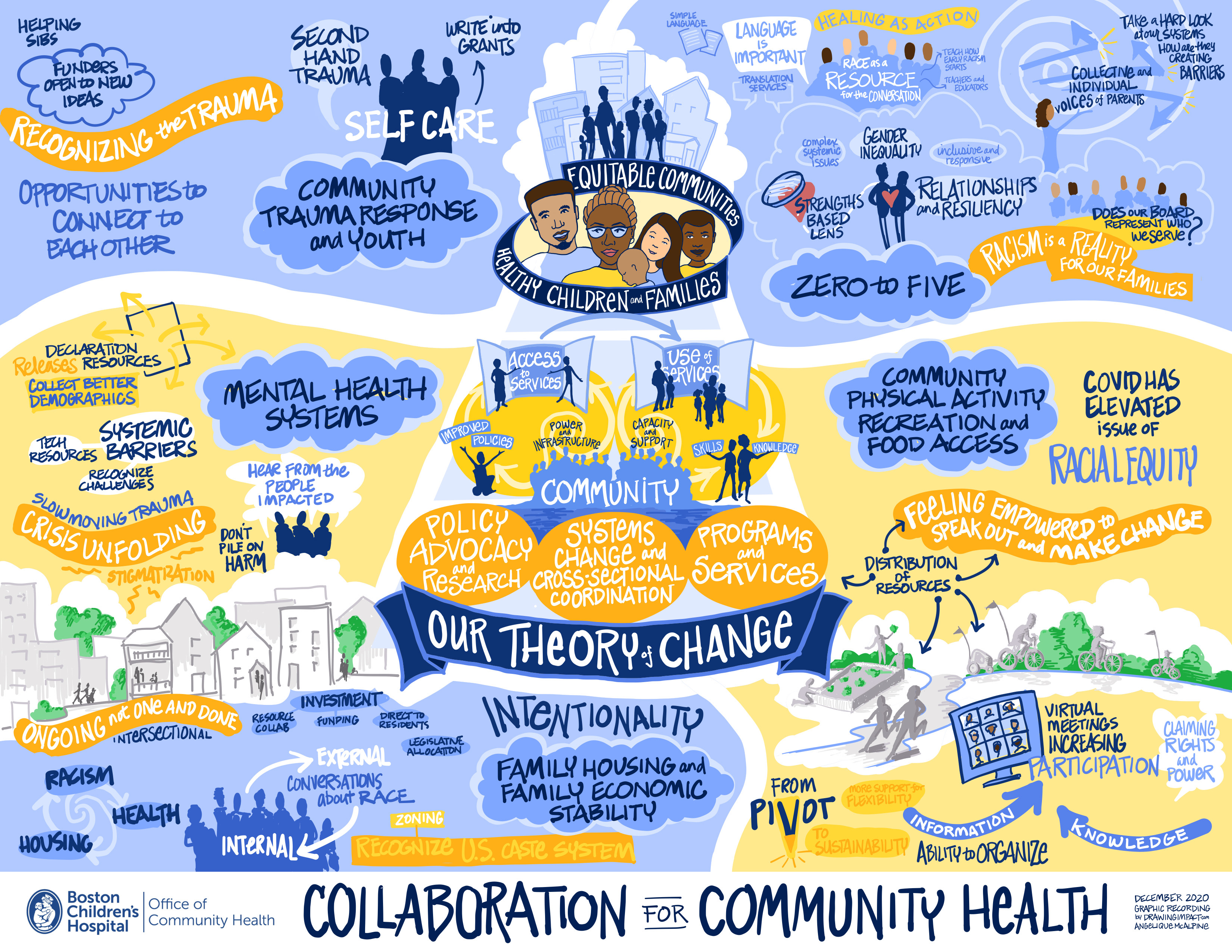
On December 3, 2020, the Office of Community Health at Boston Children’s Hospital convened (virtually) the funded partners in the Collaboration for Community Health to connect and reflect on the past year. More than 135 participants joined in, representing 47 organizations, which have been funded through Boston Children’s Determination of Need/ Community Health Initiative.
The convening partner Health Resources in Action (HRiA) facilitated the program with an agenda focused on the impact of dual pandemics—COVID-19 and racial injustice—on community organizations and the children and families served over the past several months. It was also an opportunity for the funded partners to discuss their individual and collective work, identify opportunities for continued collaboration, and share resources and lessons learned.
Early in the day, participants were reminded of Boston Children’s community mission: To improve the health and well-being of children and families in the community. “That’s been our goal for more than 30 years,” noted Dr. Shari Nethersole, Vice President, Community Health and Engagement, at Boston Children’s. Dr. Nethersole views the Collaboration for Community Health as an opportunity for the hospital to further its community mission by addressing the social determinants of health.
To date, more than half of the Collaboration for Community Health’s $53.4 million commitment has been awarded to various community-based organizations. Dr. Nethersole thanked the funded partners “for all your efforts to continue to serve children and families under these extraordinary circumstances. The fact that you’ve been able to do that offers us a lot of hope … we continue to learn from you and know that you are learning from one another too.”
Drew Koleros of Mathematica, the evaluation partner for the Collaboration, led a discussion of the Collaboration’s Theory of Change, a visual of how the funded partners’ activities contribute to improved health and well-being, which is “about being intentional regarding where we want to go [with our programs]. It’s about how we’re going to get there, and what are the steps on the pathway.”
“We are focused on the long-term impacts—healthy children and families as well as equitable communities,” Koleros added. This will be achieved through the projects funded within seven strategic funding areas in the Collaboration.
Boston Children’s goal for the funding is to bring change through policy advocacy and knowledge building, cross-sector coordination, and new programs and services. Through these channels, the hope is that knowledge and skills will increase, policies and access to services will improve, and the community’s strength will grow.
Funded partners were separated into small-groups by initiative for a chance to explore common challenges, experiences, and share tips. These sessions gave participants a welcome opportunity to dig in and compare notes with their peers. For example, the Family Housing Stability and Economic Stability group, in which racial justice discussions were held, noted that health and healthcare are “at the center of many intersecting issues,” and that the pandemic has underscored an already existing crisis in schools.
In the Mental Health Systems group, participants discussed that in Boston, the Mayor’s office declared mental health a public emergency, noting that this recognition has the potential to funnel resources to address the urgent need—which has been made even greater by the pandemic. And in the Community Physical Activity, Recreation and Food Access group, participants said, “COVID has really lifted up the issue of equity, and racial equity in particular…many of us are feeling how important it is to stand up and speak truth to power.”
After lunch, the group reconvened to hear remarks from Dr. Kevin Churchwell, President and Chief Operating Officer at Boston Children’s. Thanking the participants for their dedication, Churchwell noted the hospital’s Declaration on Equity, Diversity and Inclusion, which was formalized in August 2020 in response to nationwide protests and whose “goals are embedded in the work that we are doing and will keep doing in the years ahead. … We need to work together so that all voices are represented and heard.” Churchwell underscored the importance of the hospital’s community mission and that each partner plays a critical role in helping children and families within the communities we serve.
The final small group session allowed for participants to break out by geography. Once again, the funded partners appreciated the chance to swap notes with peers and reflect on how they have continued activities during the pandemic. During these sessions, COVID-related challenges and strategies were explored. For example, the Dorchester, Mattapan, and Hyde Park group agreed that “Since we’re not able to gather [due to COVID], it impacts how we share and connect…but we’ve found different ways to do outreach and keep engagement going.” In the Statewide group, participants shared tips on using software like Slack to connect with their staff, reducing the number of meetings to reflect present conditions, and rotating meeting facilitators to keep things fresh. In Greater Boston it was noted that the lack of in-person contact makes it difficult to verify people’s identities and direct them to the assistance they need.
The day wrapped up with one final re-convening of the larger group, during which a visual representation of the day’s journey was shared (see illustration). An illustrator who had participated in the whole day created a visual based on real time observations and listening to the day’s conversation—including elements such as the Collaboration’s goals and mission, the Theory of Change, key notes from breakout meetings, and much more. There was universal agreement that while the pandemic has made things more challenging, it has also led to opportunities for many to refocus and become more determined to bring about long-term impacts for children and families.
